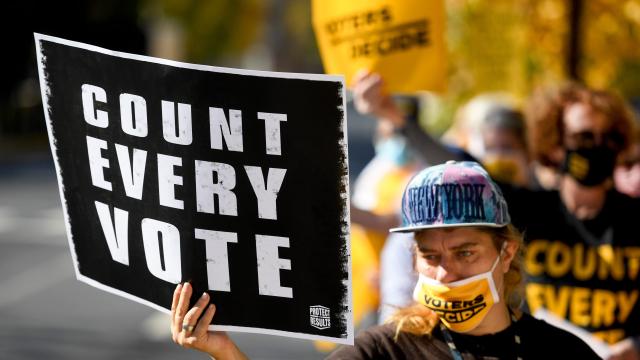Despite losing the November election by a healthy margin in the Electoral College and by a historic proportion in the popular vote, Donald Trump’s legal team has launched a number of thus-far futile efforts to gift the president a second term.
Since November 3, Trump’s lawyers have incurred a string of defeats in federal courts in Pennsylvania, Georgia, Wisconsin, and Michigan. Now the White House is exploring recounts of the final voting results in the states of Georgia — where president-elect Joe Biden won by a 14,000-vote margin — and in Wisconsin, where Biden reclaimed territory the Democrats lost in 2016 by a more convincing 20,000 votes.
Recounts historically don’t change much about election results, especially when the winner has won by tens of thousands of votes. So what, then, is the logic behind recounting a vote?
What is an election recount?
The answer is simple. An election recount is when the votes in an election are recounted because the initial result was either too close to decisively call, or when one candidate, group of voters, or another party requests a recount, usually because they’ve lost.
The process of actually requesting a recount is a bit more involved and varies according to state law — there’s no overriding set of rules for how these things are conducted on a federal level.
Requested recounts vs. automatic recounts
Some states have statutory provisions that trigger automatic recounts. If the result was razor-thin, or if there was a major administrative error or suspected fraud in any meaningful sense, the process will automatically kick into effect in the 21 states and Washington D.C. that have these laws on the books. According to the National Conference of State Legislatures, automatic recounts are “conducted if the margin between the top two candidates is within certain parameters.” In line with the muddled and disjointed makeup of United States’ government, those “certain parameters” are different across every state that has automatic recounts.
Beyond the automatic process, 43 states and Washington D.C. have additional laws for requesting a recount — as do most of the 21 states that trigger automatic recounts under various circumstances. The minutiae here is also a confusing jumble of varying state rules, but the common denominator is a rule enabling “a losing candidate, a voter, a group of voters or other concerned parties to petition for a recount,” according to the NCSL.
Perhaps even more confusingly, the states of Connecticut, Florida, Hawaii, Illinois, Mississippi, New York, and South Carolina have established no legal process at all for organising a requested recount.
What is the logic of a recount?
Human error pervades all aspects of life, so it’s possible, in theory, that the final count of an election contains inaccuracies that go so far as to sully the democratic process. In even rarer instances, it’s possible that a fairly conducted vote is too close to call. Florida’s count in the 2000 presidential election met this criteria, as the nation breathlessly watched the recount of a contest that was ultimately separated by 537 votes out of six million cast in the state. (For what it’s worth, a full, official recount of the Sunshine State’s 2000 votes was never completed, but was eventually handled later by a coalition of major news organisations, with murky results — you can read the details here, but you might want to take a few deep breaths first if you’re a Gore fan.)
Florida in 2000 was an anomaly, however, and given the margins of Biden’s victory over Trump even in Georgia, the current recount is unlikely to overturn the result.
It all boils down to maths and probability, according to Dr. Alex Rice, Assistant Professor of Mathematics at Millsaps College. He explained to Lifehacker just how rare it is for a recount to actually uncover a significant error in the absence of rampant fraud (for which, again, there is no credible evidence) and technical issues, using a mathematical example:
Let’s hypothetically say that Biden’s lead in a particular state is 10,000 votes, and let’s assume that “human error” is such that the count is off by 10,000 or more votes about 5% of the time. (The 5% is an arbitrary figure based on the usual threshold for statistical significance. Historical data on recounts indicates the probability is in fact much much lower than that.)
If the truth is that Trump won, say by one vote, then the count would come out Biden +10000 (or more) about 2.5% of the time (the other 2.5% would be Trump +10,000 or more). But, the chance of that extreme human error happening twice in a row, assuming the errors are independent, is 2.5% of 2.5%, which is 1 in 1600, or .about .06%.
In other words, if the count comes out Biden +10000, or anywhere near that, a second time, this represents an extremely unlikely occurrence in a reality in which Trump is the true winner, much more so than the first time.
Will the current recounts change anything?
If you’ve gleaned anything from Rice’s explanation, the answer is almost certainly no. As poll workers in Georgia rifle through the state’s millions of votes in an audit performed by hand, Biden’s lead appears to have diminished slightly, but nowhere near enough to hand the state to Trump. And even if the count were overturned in Georgia, it still wouldn’t be enough to tip the scales in Trump’s favour to win the Electoral College, especially considering Wisconsin also appears firmly out of sight for the incumbent.
Still, it’s worth noting the damage being inflicted on our system of government and the public’s trust in transparent and free elections by the president’s insistence that the whole process was rigged against him.

Leave a Reply
You must be logged in to post a comment.